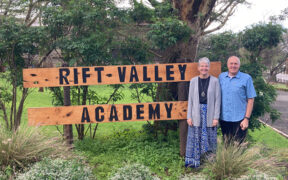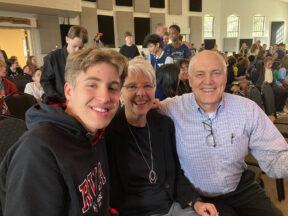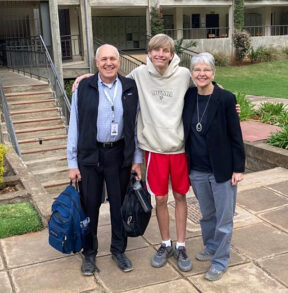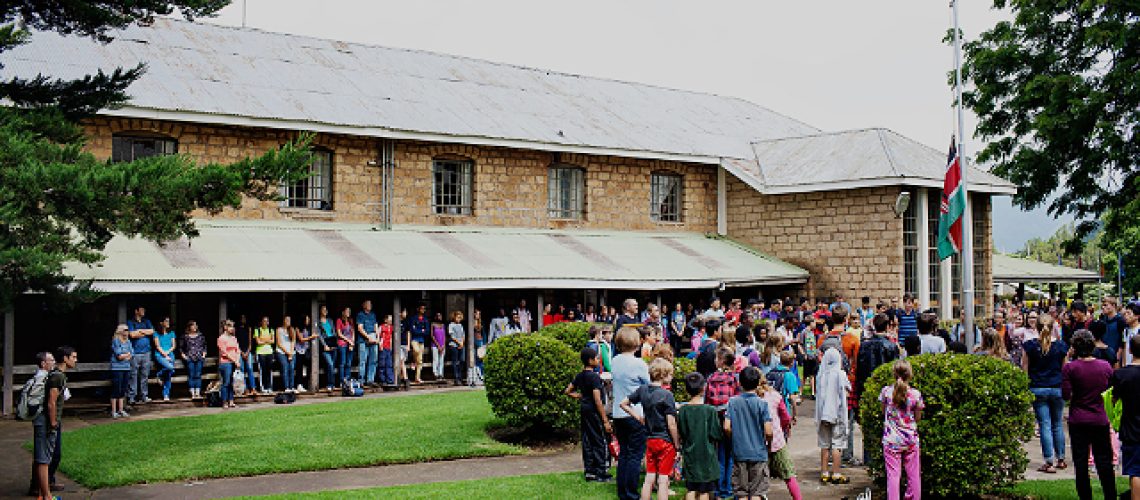 Paraclete associates Dave and Debbie Bochman expanded their already full ministry schedule by teaching Spanish for a full school year at the Rift Valley Academy in Nairobi, Kenya. I recently enjoyed the privilege of interviewing this dedicated couple.
Paraclete associates Dave and Debbie Bochman expanded their already full ministry schedule by teaching Spanish for a full school year at the Rift Valley Academy in Nairobi, Kenya. I recently enjoyed the privilege of interviewing this dedicated couple.
(Since this interview in April, severe rain, flooding, and landslides inundated the country. Please pray for safety and recovery from this disaster.)
Tell me a little bit about your ministry history.
Dave: We joined Mission Aviation Fellowship in 1982 and served in that organization for 27 years. Our first international posting was for 11 years in Ecuador. After that, we transferred to Russia, where we served for six years. I then became MAF’s Regional Director for Eurasia, focusing on the 10/40 window. We had projects across North Africa, Central, South, and Southeast Asia. During those years, we lived in Budapest, Hungary. In 2005 I was asked to take the MAF COO role – which meant a move back to MAF’s US headquarters (Nampa, Idaho). We resigned from MAF in mid-2009 and shifted to Paraclete to develop a broader leadership/organizational development and training ministry that we have been involved in ever since.
What are your normal PMG activities?
Dave: My driving focus is helping Christian mission and humanitarian organizations prepare for ongoing effectiveness into the future. In my transition from MAF to Paraclete, I earned a PhD in organizational development and adult learning. I wanted to learn how to help mission organizations become more agile and better able to adapt to the rapidly changing world. Increasingly, organizations are being led by multicultural teams, so I also focused on the intercultural relational skills that are needed in those situations, as well as strategy formation, effectiveness evaluation, etc. Since joining Paraclete, I’ve served on a few ministry boards in an organizational development or leadership development capacity. I’ve also worked directly with the leadership of ministry organizations. If an organization has a particular area of need, I help analyze the situation. I might fill a specific role for a period of time to help an organization through a transition or do some mentoring and coaching with the existing leadership. I’ve served as interim Executive Director for a couple of organizations. Sometimes, I lead staff training or workshops for leadership teams. Over the years I’ve been involved in a wide variety of activities related to organization development, organizational resiliency and agility, and strategy formation.
In addition to those organizational projects, a large portion of my time over the past several years has been serving as Academic Dean for an accredited Master of Arts in Organizational Leadership program run by DAI [Development Associates International https://daintl.org/programs/maol/] in conjunction with many local academic partners across Asia, Africa, and Latin America. It is designed to train the “next generation” of Christian leaders through a lens of Biblical Servant Leadership in their cultural contexts using short on-site residencies, followed by studying online for the remainder of each semester. We currently operate the MAOL program in 18 countries with an enrollment of about 1100 students. These Christian leaders are all mid-career. They will be the future ministry leaders in their countries. In addition to serving as Academic Dean for this program, I have enjoyed teaching a couple of classes every year. I recently wrapped up a cohort in one country in South Asia, and I am currently teaching the Strategic Leadership class to a cohort of 20 students in another South Asian country.
Debbie: Dave’s done some of the leadership development projects with our local church, too. He’s met one-on-one with many of the pastors and ministry leaders. After this year in Kenya, we’ll return to Montana and we anticipate growing back into some of those mentoring relationships again.
Dave: Beyond the leadership and organizational development activities, our Paraclete ministry has also included leading intensive discipleship groups. This aspect of our ministry was originally rooted in our own need for personal growth as missionaries. We realized, as we served that there were aspects of our inner lives that had never really been transformed in the discipleship training that we had received.
Debbie: Yes — in 2007, I first participated in what was called back then, the “Aphesis” group. It’s now called Untying the Knots of the Heart (UTK) [https://untyingknots.org/]. Dave participated in another Aphesis group shortly after me. We both experienced significant breakthroughs in our spiritual growth through that small group discipleship process. After going through it as participants, we became group facilitators ourselves. Over the years since I’ve led a lot of UTK groups with women. Dave and I have also co-facilitated many mixed-gender UTK groups. We filled various roles in the administration and leadership of that ministry when we lived in Idaho. Dave also enjoyed co-leading several UTK facilitator trainings in China, Taiwan, Singapore, Hong Kong, as well as Costa Rica and Ecuador. Dave still serves as treasurer of their board of directors. That organization is now called Inner Life Ministries.
Before our move to Kenya, I also worked with Hope Pregnancy Resource Center in their family life training center, where young parents come to take parenting classes. I helped run the boutique that offered baby clothing and supplies for these parents. When we return to Montana in a couple of months, I plan to reengage in that ministry.
What caused you to step away from many of those activities and choose to work with Rift Valley Academy for this school year?

Dave: Our two grandsons were the catalyst. Our oldest grandson wrote to us in April 2023, asking us to come. He and his brother both attend Rift Valley Academy (RVA) in Kenya. Their parents, our daughter and son-in-law, serve in Chad, Africa, with TEAM. When your 16-year-old grandson says, “Grandpa, Grandma, it’d be so great if you were here to be a family presence for us. Would you consider coming and living at RVA?” How could we resist? Their parents were planning to go on home assignment in the US in 2024. In order for the boys to remain at RVA and have continuity in their education during that time, they needed to have “on-continent” guardians.
Debbie: When we investigated what roles RVA needed to be filled (so we could live on campus), we discovered they were in desperate need of teachers for the high-school students taking Spanish as their language electives.
Can you unpack more about the needs you each meet at Rift Valley Academy?
Debbie: Rift Valley Academy is a boarding school (K-12) with about 500 students from 30+ nationalities. Most are children of missionaries serving in various countries in Africa. We are teaching two sections of Spanish 1, two sections of Spanish 2, and one section of Spanish 3.
Dave: About 65 of the high school students are taking Spanish as their required foreign language. RVA also offers French and Swahili as language options.
Debbie: I taught levels 1 and 2 Spanish in the school in Budapest, Hungary, where we lived when our youngest daughter was in high school (20+ years ago).
Dave: Debbie is trained as an elementary and middle school teacher. During this school year, I am also filling some interim leadership roles (organizational and academic) as part of the RVA leadership team.
Debbie: Our plan is to be here for one school year. July 6th is graduation day. That night, we fly back to the States.
What qualified you to teach Spanish? You were in Ecuador, what, 11 years?
Dave: Yes, 11 years—but that was in the ‘80s and early ’90s. I’ve kept up with Spanish because over the years we’ve served with Paraclete, I have led several trainings in Costa Rica, Cuba, and Ecuador. I feel comfortable speaking Spanish in a wide variety of contexts. Written Spanish is more challenging.
Did either of you suspend your previous Paraclete work while you were serving at RVA? If not, how did you manage both? Can you unpack that a little bit?
Dave: Several of our projects and activities were wrapped up prior to moving to Kenya. Others were put on hold. Part of the agreement with RVA was that I could continue to carry on some of our Paraclete ministry (primarily my DAI MAOL role) while at RVA. I normally work remotely anyway — and when I needed to travel, I could hub out of Nairobi. During the time I have been in Kenya, I have made trips to Bangladesh, Sri Lanka, and India for DAI during school breaks. (The RVA school schedule has very long breaks between their three terms so that children living in dormitories are able to go home to be with their parents.) In addition to my travel for DAI, Debbie and I have also been able to visit Chad (Christmas), Tajikistan (Easter), and Switzerland (for ministry planning meetings). I’ve also maintained some degree of continuity in my board roles by connecting into meetings via video conferencing. On one board, I’m the Treasurer, on another board, I’m the head of the Governance committee. Admittedly, I have ratcheted back the amount of work I do between board meetings. Both of those organizations have been very accommodating and supportive of our 1-year stint at RVA.
Debbie: For our UTK [Untying the Knots of the Heart] discipleship group ministry, we contacted two people who were participants in our group last year. They completed the group facilitation training online and then led a new UTK group this year at our church in Montana. When we go back after our time in Kenya, we’re anticipating we’ll re-engage in the UTK ministry. We may have two groups running then. One that we would run and one they would run. We’ll have to see how that goes.
Dave: When we return to Montana, we’re going to re-evaluate all our ministry commitments and activities. Because of our age, stage of life, and a variety of other factors, we’re also making steps towards slowing down towards partial retirement. Thankfully, I have been able to step back from the Academic Dean role with the DAI MAOL program. At this point, I anticipate continuing to teach a couple of courses per year and provide some special assistance on a case-by-case basis. Our year in Kenya has served as a catalyst for us to refocus our lives and ministry activities considering our stage of life.
What was your greatest challenge?
Debbie: My personal greatest challenge has been learning to do everything online. The grading, attendance, and everything is done online. I sweat buckets the first term, but now I know how to do it, so I’m OK.
Dave: I love hanging out with our teenage grandsons. But classroom management of high schoolers has been challenging for me. My Spanish 3 students are mostly upperclassmen. They are self-motivated and curious – and more like the adult learners that I’m used to. Working with them is a delight. But the underclassmen who are taking Spanish only because they need a language credit are more of a challenge. I’ve never been the “youth pastor” type of teacher. I normally expect my students to want to learn and to be driven by curiosity. The classroom dynamics for my Spanish 2 groups has been my greatest challenge. Also, for me, teaching Spanish grammar is not as enjoyable as teaching concepts and spiritual truths in Spanish.
What was your greatest blessing?

Dave: The grandkids! Over the years, we’ve always had good relationships with them, but because they’ve lived in Africa, we haven’t been able to nurture and develop the relationships and be part of their daily lives.
Debbie: We see them most days between classes or at chapel. They come to our house and have supper once a week with us. Once a week Dave takes a one-on-one walk with each of them, so yes, we do enjoy a lot of connection with the boys.
Dave: The boys get along well together as brothers, but they live in different dorms. It has been good to get to know their dorm parents. We especially enjoy getting to know all their friends too.
Debbie: RVA has small group gatherings called Caring Community. Eight students come to your home and you’re with them several times during each term. One of our grandsons is in our Caring Community along with seven other students his age.
Dave: We’re also Sophomore class sponsors, which means that we help with the planning and execution of many 10th-grade social events. We enjoy weaving our lives into the social fabric with our grandsons and their social networks. One grandson is in the school dramas. The other grandson is involved in choir and sports (basketball and volleyball). It’s been fun attending the performances and watching the home games.
Debbie: Just being a grandpa and a grandma has really been sweet. That’s our greatest joy.
Is there anything else you want to add?
Dave: I encourage anyone who might be interested in this kind of ministry to consider serving at Rift Valley Academy [https://rva.org/]. RVA has needs for dorm parents, teachers of all grade levels and subjects, administrators, counselors, coaches, etc. RVA has a 90-acre campus that is located next to a large missionary teaching-hospital complex and a Bible college. There are so many ways you can serve in this community! RVA is an easy place to live and serve. The campus is beautiful, with lots of monkeys, birds, and butterflies (but no mosquitoes due to the altitude) and flowers. It is a secure campus. You can drink the water out of the tap. All the rooms in all the buildings are wired with 110v electrical outlets as well as 220v. RVA is a delightful school complex that has an American/Canadian feel but with a multi-cultural mix in the faculty/staff as well as the student body.

